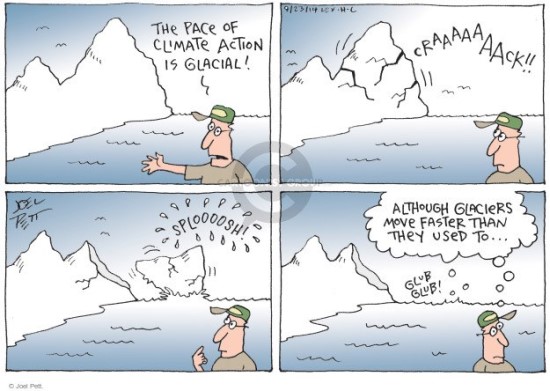
Story of the Week... Editorial of the Week... Toon of the Week... Video of the Week... Coming Soon on SkS... Climate Feedback Claim Review... SkS Week in Review... Poster of the Week...
Nairobi, 14 January 2021 – As temperatures rise and climate change impacts intensify, nations must urgently step up action to adapt to the new climate reality or face serious costs, damages and losses, a new UN Environment Programme (UNEP) report finds.
Adaptation – reducing countries’ and communities’ vulnerability to climate change by increasing their ability to absorb impacts – is a key pillar of the Paris Agreement on Climate Change. The agreement requires its signatories to implement adaptation measures through national plans, climate information systems, early warning, protective measures and investments in a green future.
The UNEP Adaptation Gap Report 2020 finds that while nations have advanced in planning, huge gaps remain in finance for developing countries and bringing adaptation projects to the stage where they bring real protection against climate impacts such as droughts, floods and sea-level rise.
Public and private finance for adaptation must be stepped up urgently, along with faster implementation. Nature-based solutions – locally appropriate actions that address societal challenges, such as climate change, and provide human well-being and biodiversity benefits by protecting, sustainably managing and restoring natural or modified ecosystems – must also become a priority.
“The hard truth is that climate change is upon us,” said Inger Andersen, Executive Director of UNEP. “Its impacts will intensify and hit vulnerable countries and communities the hardest – even if we meet the Paris Agreement goals of holding global warming this century to well below 2°C and pursuing 1.5°C.”
“As the UN Secretary-General has said, we need a global commitment to put half of all global climate finance towards adaptation in the next year,” she added. “This will allow a huge step up in adaptation – in everything from early warning systems to resilient water resources to nature-based solutions.”
Adaptation planning is growing, but funding and follow-up lagging
The most encouraging finding of the report is that 72 per cent of countries have adopted at least one national-level adaptation planning instrument. Most developing countries are preparing National Adaptation Plans. However, the finance needed to implement these plans is not growing fast enough.
The pace of adaptation financing is indeed rising, but it continues to be outpaced by rapidly increasing adaptation costs. Annual adaptation costs in developing countries are estimated at USD 70 billion. This figure is expected to reach USD 140-300 billion in 2030 and USD 280-500 billion in 2050.
There are some encouraging developments. The Green Climate Fund (GCF) has allocated 40 per cent of its total portfolio to adaptation and is increasingly crowding-in private sector investment. Another important development is increasing momentum to ensure a sustainable financial system. However, increased public and private adaptation finance is needed. New tools such as sustainability investment criteria, climate-related disclosure principles and mainstreaming of climate risks into investment decisions can stimulate investments in climate resilience.
Implementation of adaptation actions is also growing. Since 2006, close to 400 adaptation projects financed by multilateral funds serving the Paris Agreement have taken place in developing countries. While earlier projects rarely exceeded USD 10 million, 21 new projects since 2017 reached a value of over USD 25 million. However, of over 1,700 adaptation initiatives surveyed, only 3 per cent had already reported real reductions to climate risks posed to the communities where the projects were being implemented.
Nature-based solutions for adaptation can make a huge contribution
The report places a special focus on nature-based solutions as low-cost options that reduce climate risks, restore and protect biodiversity and bring benefits for communities and economies.
An analysis of four major climate and development funds – the Global Environment Facility, the Green Climate Fund, the Adaptation Fund and the International Climate Initiative – suggested that support for green initiatives with some element of nature-based solutions has risen over the last two decades. Cumulative investment for climate change mitigation and adaptation projects under the four funds stood at USD 94 billion. However, only USD 12 billion was spent on nature-based solutions – a tiny fraction of total adaptation and conservation finance.
Stepping up action
According to the report, cutting greenhouse gas emissions will reduce the impacts and costs associated with climate change. Achieving the 2°C target of the Paris Agreement could limit losses in annual growth to up to 1.6 per cent, compared to 2.2 per cent for the 3°C trajectory.
All nations must pursue the efforts outlined in UNEP’s Emissions Gap Report 2020, which called for a green pandemic recovery and updated Nationally Determined Contributions that include new net-zero commitments. However, the world must also plan for, finance and implement climate change adaptation to support those nations least responsible for climate change but most at risk.
While the COVID-19 pandemic is expected to hit the ability of countries to adapt to climate change, investing in adaptation is a sound economic decision.
About the UN Environment Programme
UNEP is the leading global voice on the environment. It provides leadership and encourages partnership in caring for the environment by inspiring, informing and enabling nations and peoples to improve their quality of life without compromising that of future generations.
Step up climate change adaptation or face serious human and economic damage – UN report, Press Release, UN Environment Programme, Jan 14, 2021

In a move touted as “improving the utility of federal advisory committees,” President Trump signed Executive Order 13875 in June, requiring all federal agencies to reduce the number of their advisory committees by no less than one-third. By doing so he continued to diminish the role of science in government.
Advisory committees help protect Americans from health threats like Covid-19, cancer, and heart disease, and have become an essential component of our national security. Many federal advisory committees focus on science, medicine, health, and technology, and range from advising on pesticides and public safety to preventing breast cancer and managing the demands on the health care workforce. Some of the scientific advisory committees eliminated by the executive order were charged with giving advice to the directors of major federal health agencies, including the Centers for Disease Control and Prevention and the National Cancer Institute.
The incoming Biden administration needs to reinstate these advisory boards so the federal government has access to a broad network of clear-thinking, independent public health advisers who will safeguard the nation in a rapidly changing world.
Stop sidelining science. Bring back federal scientific advisory committees, Opinion by Melissa J Perry, STAT, Jan 11, 2021

Hat tip to the Stop Climate Science Denial Facebook page.
The Frederick S. Pardee Center for the Study of the Longer-Range Future at the Pardee School of Global Studies is pleased to present “The World After Coronavirus” video series. The series features more than 100 interviews with leading experts and practitioners from Boston University and across the world, exploring the challenges and opportunities we will face in our post-coronavirus future. The series is hosted by Prof. Adil Najam, the Inaugural Dean of the Pardee School of Global Studies and former Director of the Pardee Center. This video is a compilation of highlights on the future of daily life after COVID-19.
Read more about the series: https://www.bu.edu/pardee/worldafterc...
Pardee School: https://www.bu.edu/pardeeschool | @BUPardeeSchool
Pardee Center: https://www.bu.edu/pardee | @BUPardeeCenter
I spoke to 99 big thinkers about what our ‘world after coronavirus’ might look like – this is what I learned by Adil Najam, The Conversation US, Jan 12, 2021
CLAIM: “there has not been a long-term distinctive change in sea level rise rates in the last 120 years”
VERDICT: ![]()
SOURCE: Kenneth Richard, Pierre L. Gosselin, NoTricksZone, Watts Up With That?, 11 Jan 2021
KEY TAKE AWAY: The rate of global sea level rise has changed over the past 120 years and accelerated since the early 1990s, based on tide gauge and satellite data. Current sea level rise primarily results from glacial ice melting and the expansion of seawater as it warms due to human-caused global warming.
Click here to access the detailed analysis of this claim by a panel of experts.
Rates of global sea level rise have accelerated since 1900, contrary to bloggers’ claims, Edited by Nikki Forrester, Claims Analysis, Climate Feedback, Jan 15, 2021

Posted by John Hartz on Sunday, 17 January, 2021
 |
The Skeptical Science website by Skeptical Science is licensed under a Creative Commons Attribution 3.0 Unported License. |